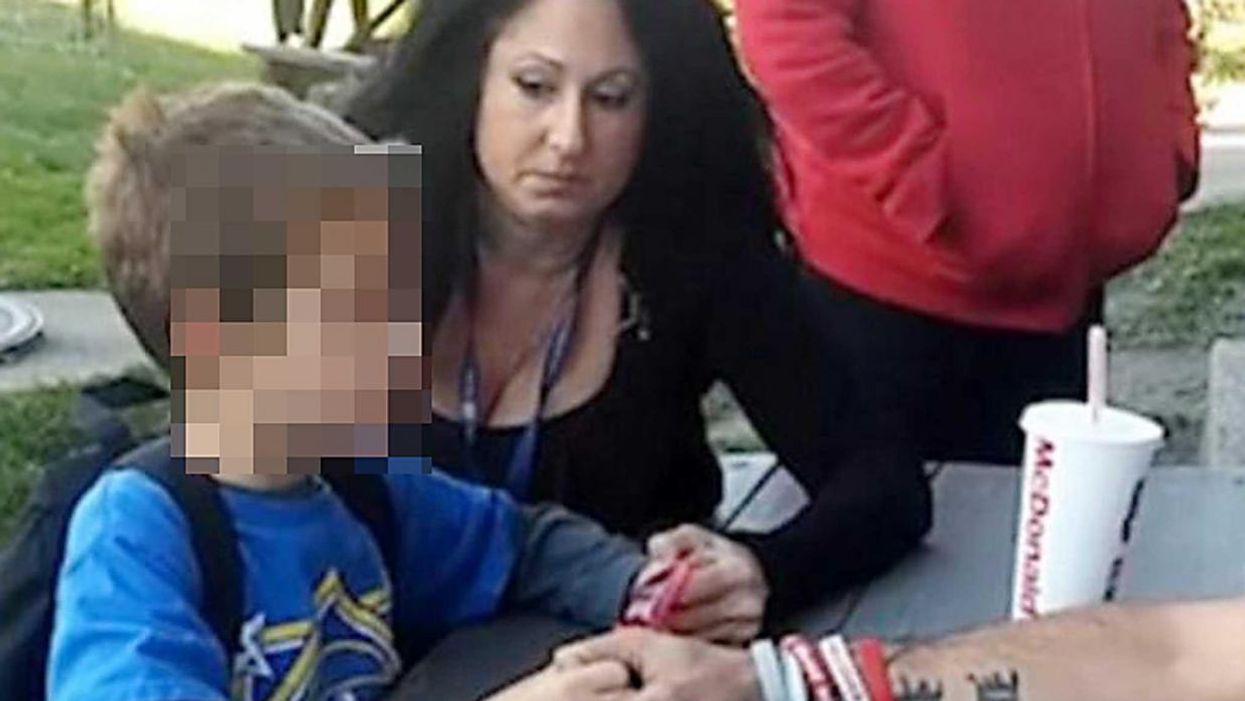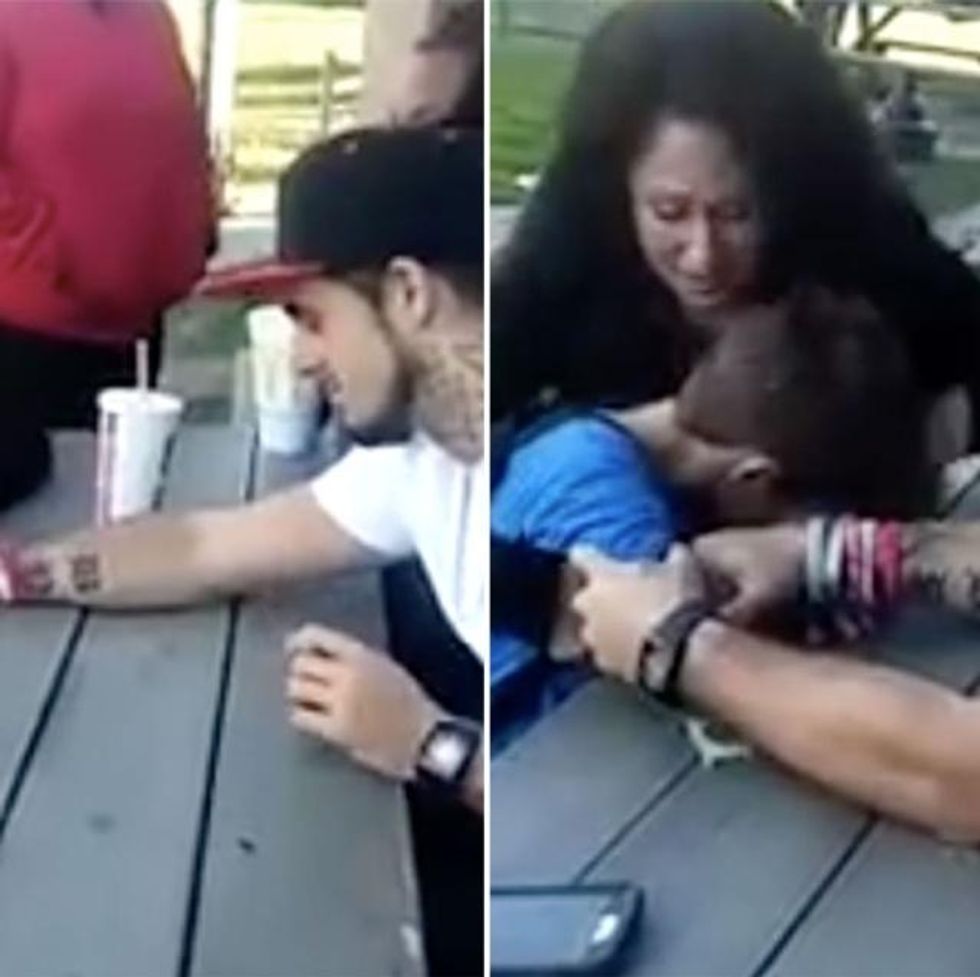News
Lindsey Bever
Oct 16, 2016

Brenden Clark sat across from his 8-year-old son at a picnic table in northeastern Ohio, preparing to deliver devastating news.
"I've got something to tell you, okay?" he said, reaching across the table to take his son's hand.
The 29-year-old father bowed his head and took a deep breath, then flicked the ashes from a cigarette resting between his fingers.
The young boy, still wearing his backpack after a long day at school, looked anxiously at his grandmother, who was sitting beside him.
"Mommy died last night," Clark told his son. "Okay?"
His son, Cameron, stared into his father's face.
"What?" he said.
"Mommy died last night. Okay?" Clark repeated, his voice beginning to break.
"What do you mean? My mom?" he questioned.
"Yes," Clark said quietly.
"How!" the boy cried out.
"From drugs," Clark said.
The boy fell into his grandmother's arms and let out an agonizing wail. "God!" Clark said, reaching across the table to grab his son.
Seconds later, Clark walked across the picnic table and wrapped his arms around his child.
"I'm so sorry," he told him.
The heart-wrenching scene was captured on camera and posted Monday night on Facebook, where it has since been widely shared and watched millions of times -- revealing a very personal and private moment for a young boy undoubtedly in agony.
The viral video has since struck a nerve both with those who feel for a father hoping to scare other addicts straight and those who believe he took it a step too far.
Clark, who said he is currently recovering from a heroin addiction and has been clean for nearly 100 days, explained that he recorded the video without his son's knowledge because he wanted those in the throes of drug addiction to see how their own children might one day learn their parents had died of an overdose.
Just like that, in an instant, an 8-year-old boy had become the sobbing face of the collateral damage from the nation's opioid epidemic that, each day, claims some 78 lives, according to data from the Centers for Disease Control and Prevention, leaving many children without a parent, sometimes both parents.
"That was my motive in putting it out there -- to show the impact it has on our children," Clark said in an exclusive interview with NBC affiliate WFMJ.
Authorities confirmed to The Washington Post that Cameron's mother, 29-year-old Lacy Wood, died of a suspected heroin overdose Sunday in Warren, Ohio, near the Pennsylvania border. A spokeswoman for the Trumbull County coroner said results of toxicology tests to determine the official cause of death are pending.
Clark said that his son had not seen Wood for more than a year because of her addiction but that she had stayed in contact with her son.
Clark said he has also struggled with drug addiction -- mainly heroin but, occasionally, crack cocaine.
"My son knows that both of his parents are drug addicts," Clark told The Post in a phone interview. "He knew his mother was a drug addict. And he knows that his father is a recovering drug addict -- a drug addict clean and in recovery."
In 2015, there were 3,050 fatal drug overdoses reported in Ohio, continuing to make unintentional overdoses the main cause of injury-related deaths across the state, according to data from the Ohio Department of Health.
Clark, who is from Warren, said he moved to another town to try to escape the drugs available at home. He said he is currently in a 12-step program and living in a sober house in Youngstown, about 15 miles away.
"I was tired of the way I was living," he said. "I was tired of being only 135 pounds and looking sick and feeling sick; every day, waking up wondering how I was going to beg for money, who I was going to con, who I was going to possibly steal from, who I was going to lie to. The conning and the conniving -- I was tired of it all."
Cameron's paternal grandmother has had custody of him since he was a baby, according to the family.
"THIS FOR ANY AND EVERY ADDICT WITH CHILDREN," Clark said in a Facebook post with the video. "TODAY I HAD TO TELL MY 8 YEAR OLD SON THAT HIS MOMMY DIED FROM A DRUG OVERDOSE LAST NIGHT. THIS IS THE REALIZATION AND REALITY OF OUR DISEASE. DONT LET THIS DISEASE HAVE TO MAKE SOMEONE TELL YOUR CHILD THAT YOUR DEAD BECAUSE OF DRUGS. THIS WAS ONE OF THE HARDEST THINGS IVE EVER HAD TO DO. MY SON HAS NO MOTHER BECAUSE OF HEROIN."
"THIS WASNT STAGED," he added. "THIS WAS REAL."
Clark told The Post he wanted to "show the effects of what happens after -- the aftermath of the addiction when it all comes to an end."
Although he told WFMJ that he did not tell his son he was recording him, he said he did get his son's permission before posting it.
"To put it plain and simple to him," he told The Post, "I told him this might save lives.
"And that made him happy, that made him comfortable, that made him okay with it," he said.
An online commenter who supported Clark's call to action expressed a sentiment similar to others, saying, "yes that was hard on the child," but adding, "sometimes it takes that kind of real pain to open someone's eyes this is the effect drugs have on children."
Clark said he has also received several messages from people who told him that they are addicts and that his son's reaction to his mother's overdose death made them want to kick their own drug habits.
But the negative reactions -- many arguing he exploited his son -- have hit him hard, he said.
"My recommendation would be to protect your child first and educate the public second," said Jamie Howard, a clinical psychologist who heads the Trauma and Resilience Service at the Child Mind Institute. "I do appreciate the father's intention -- trying to turn this into something good, trying to help other people."
"What I would recommend is that you let your child have their moment to grieve privately and then, when they're more regulated, ask them if they want to talk," she added. "Because that would be almost more poignant to hear a young child, who's not in total shock, talking about how much they miss their mother."
Howard pointed out that even a child who is okay with the publicity now may resent it in the future.
Some critics, Clark said, even said he should have never told a child so young how his mother died.
"You want me to lie to my son and say, oh, what, it was a car wreck or suicide?" Clark said in the interview with WFMJ.
"No, I'm going to be honest with my son because, you know what, in the future, when someone tries to offer him something, some drugs or whatever the case may be in whatever situation, maybe my son will think about this and see what it did to his family, see what it did to his mother."
Clark said that even when he was on drugs, he believes a video like this would have grabbed his attention.
"I would have bawled my eyes out," he said, adding, "Even drug addicts prioritize their children, they do."
But Benjamin Nordstrom, chief clinical officer for Phoenix House, a drug and alcohol rehabilitation organization, said that although it's impossible to speak in generalities, many times, addicts respond more to hope than to fear.
"They want to work toward something positive as oppose to run away from something negative," he said.
Clark said he knew it would be hard for his son to hear the news, but he hoped it might help others.
"I knew it was going to be emotional for him, I knew it was," he said about news. "I knew it was hurtful.
"I guess at that moment I wasn't thinking how recording it and how his emotions at the same time would exploit him. I guess I wasn't thinking about that," he said. "Maybe I was wrong at that moment. Although I do not have any regrets about posting it."
Washington Post
Top 100
The Conversation (0)














